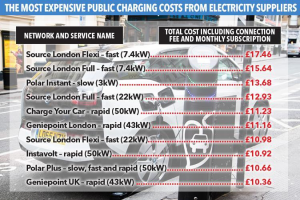6 Hidden Costs of Electric Vehicles

Electric vehicles (EVs) are becoming more popular as people seek an eco-friendly alternative to traditional gasoline-powered cars. However, before making the switch, it’s essential to be aware of the hidden costs that come with owning an electric vehicle. In this article, we’ll explore six of the hidden costs of electric vehicles.
1. Purchase Price
When comparing EVs to traditional cars, the initial purchase price is often higher for electric vehicles. Although the cost of EVs has decreased in recent years, it still remains higher than gas-powered vehicles. This can be a significant financial burden, especially for those on a tight budget.
2. Upfront Installation Cost of Charging Station
EVs require a charging station, which typically needs to be installed in the owner’s home or workplace. The installation costs for a home charging station can range from $1000 to $2500, depending on the type of station and the complexity of the installation process.
3. Electricity Costs
Charging an EV at home requires electricity, which can become a hidden cost over time. While charging an EV costs less than filling up a gas tank, the amount of electricity used can add up over time. This is especially true for those who drive long distances or charge their vehicle frequently.
4. Battery Replacement Costs
The batteries in EVs have a limited lifespan and will eventually need to be replaced. The cost of battery replacement can be quite significant, especially for older models. The cost of a new battery can range from $3000 to $5000, depending on the make and model of the vehicle.
5. Maintenance Costs
Although EVs require less maintenance than traditional cars, there are still maintenance costs to consider. The brakes and tires on an EV still need to be replaced, and there are still other maintenance tasks that need to be performed, such as regular inspections and fluid changes.
6. Insurance Costs
Insurance costs for EVs tend to be higher than for gas-powered vehicles. This is because EVs are more expensive to repair and replace in the event of an accident. Additionally, electric vehicles tend to be more technologically advanced, which can make repairs more complex and expensive.
In conclusion, owning an electric vehicle comes with hidden costs that are essential to consider before making the switch. While EVs are more eco-friendly, they can be a significant financial burden in terms of the initial purchase price, installation costs, electricity costs, battery replacement, maintenance, and insurance. However, with proper planning and consideration of these hidden costs, owning an electric vehicle can be a wise long-term investment.






